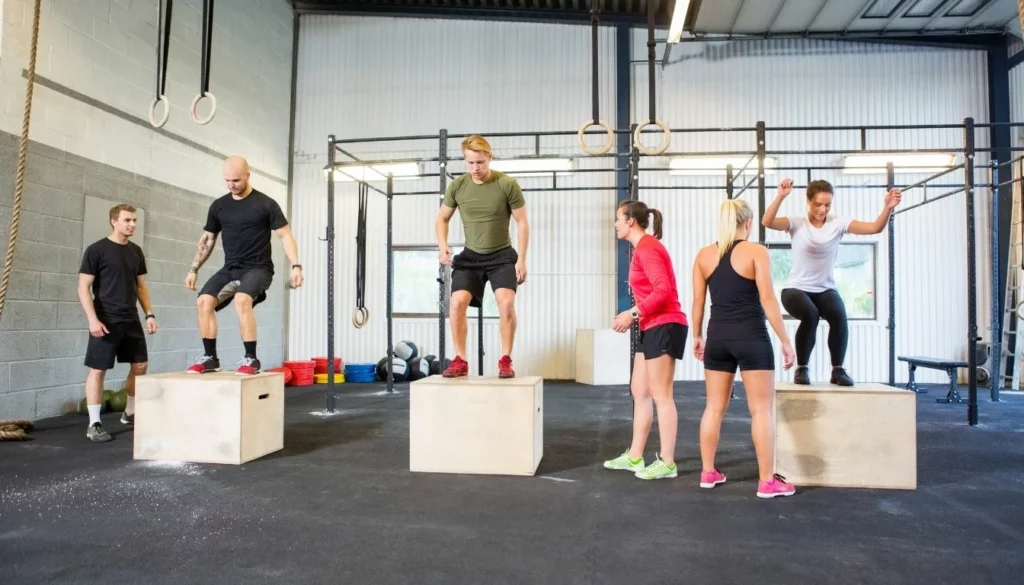Dynamic Jump Rope HIIT Workout is a great workout routine that will help you burn fat and build muscle. It’s an intense cardio workout ideal for Jumping Rope for Weight Loss that will leave you feeling energized and ready to take on the day.
Dynamic jump rope workouts are great for cardio and strength training. They are also very easy to do at home. This workout is designed to increase your heart rate and burn calories fast. It’s a great way to start off your day or end it.
Jump Rope & High-Intensity Interval Training
Jump rope is a great way to burn calories and build strength. The key is to jump rope for 30 seconds at a time, rest for 10 seconds, then repeat. This exercise burns about 300 calories per hour. If you want to increase the intensity, try high-intensity interval training (HIIT). HIIT is an exercise where you work out for short periods, followed by longer recovery periods. During the workout, you should be working at 100% effort, meaning you should feel like you cannot go any further. After each set of exercises, you should recover for one minute.
How to Use a Jump Rope for Exercise
To use a jump rope as part of your fitness program, simply hold the handles with both hands while jumping in place. You can either stand still or move around during this activity. Start slowly and gradually pick up speed until you reach full stride. Once you have mastered basic jumps, add some weight to the ropes so they become more challenging. For example, if you don’t know how to jump rope properly, just grab two 5 pound weights from your local gym and attach them to the ends of the rope. Then, make sure not to let the weights fall down when you practice!
The Benefits of Dynamic Jump Ropes

A dynamic jump rope provides many benefits including:
– Cardio – A good cardiovascular workout that works all major muscles groups.
– Strength – Builds upper body strength through resistance training.
– Flexibility – Improves flexibility and range of motion.
– Balance – Helps improve balance and coordination.
– Core – Strengthens abdominal core muscles.
– Burn Fat – Increases metabolism which helps reduce belly fat.
– Improve Mood – Boost energy levels and mood.
– Reduce Stress – Reduces stress hormones such as cortisol.
What Are Some Exercises That Can Be Done With a Jump Rope?
There are several different types of exercises that you can perform using a jump rope. Here are some examples:
Jumping jacks
Stand tall with feet together and arms extended above head. While keeping legs straight, lift knees toward chest, lower back into position, then return to starting position. Repeat 20 times.
Squats
Hold the handle of the jump rope between the thumb and index finger. Bend forward at hips and squat down until thighs are parallel to the floor. Return to a standing position. Alternate left leg first, right leg second. Perform 8 repetitions.
Lunges
Step forward with your right foot and bend your knee slightly. Place left hand on hip and step forward with left foot. Lower torso towards the ground until thigh almost touches floor. Rise back up to starting position. Continue alternating sides. Do 12 reps.
Side lunges
Standing sideways, raise arm over the shoulder and turn side to side. Keep opposite leg lifted throughout the movement. Complete 6 reps on each side.
Pushups
Begin lying faceup on the mat with elbows bent 90 degrees and palms facing away from body. Raise shoulders off floor and extend arms overhead. Slowly lower yourself back down to starting position. Repeat 15 times.
Triceps dips
Lie flat on your stomach with hands behind neck. Lift chin off floor and look upward. Keeping elbows close to body, dip downward until forearms touch floor. Reverse direction and bring hands back to starting position. Repeat 16 times.
Plank
Get into pushup position but instead of raising your entire body, only raise your body halfway. Your body must remain completely rigid without bending your elbows. Rest here for 60 seconds before repeating plank pose again.
This exercise is great for strengthening abs and building endurance.
Jump rope workouts are an excellent way to get fit and stay motivated. To learn more about these fun activities, check out our article on how to use the jump rope and other exercise equipment.
How Long Should I Practice Per Day?

You should be able to complete one set of 10-12 repetitions per day. However, it may take 2 weeks to build muscle memory. So start slow and work your way up to 30 minutes daily. Also, remember to warm up before performing any type of physical activity. Warm-ups help prevent injuries by increasing blood flow to working muscles. They also increase heart rate and breathing capacity. Try doing 3 sets of 10-15 squats followed by 1 minute of stretching.
If you want to try a new form of cardio called interval training, consider adding intervals to your routine. Interval training involves short bursts of high intensity followed by longer rest periods. It has been shown to burn calories faster than traditional forms of aerobic exercise. One study found that people who performed three rounds of sprinting followed by five minutes of walking burned approximately 300 extra calories compared to those who walked continuously. Another benefit of interval training is that it improves overall health by increasing metabolic rates and stimulating growth hormone release. In addition, it reduces risk factors associated with chronic diseases such as diabetes and obesity.
When Is The Best Time Of Day To Perform These Activities?
The best time to perform the exercises listed above is in the morning or evening. Morning routines tend to focus on strength, while evening routines emphasize flexibility. For example, if you do planks in the morning, stretch afterward. Stretching helps loosen tight joints and improve circulation, leading to better performance later in the day. You will find that many of the same benefits apply when using weights versus free weight movements. Weight lifting requires less energy expenditure than other types of cardiovascular exercise so you’ll have plenty of stamina after completing this workout.
What Are Some Benefits That Come From Doing Cardio Exercises?

Cardiovascular exercises provide numerous benefits, including increased metabolism, improved moods, reduced stress levels, greater self-esteem, stronger immune systems, healthier hearts, and decreased risks of certain cancers. When choosing what kind of cardio to include in your fitness program, keep in mind your available time. A good rule of thumb is to choose something that takes no more than 20 minutes to complete. Remember that there are different ways to incorporate cardio into your life. Here are some ideas:
- Walk briskly around the block at least once every hour.
- Bike slowly along country roads.
- Take long walks through parks and nature preserves.
- Run errands rather than driving.
- Park farther away from destinations and walk whenever possible.
- Go swimming several days a week.
- Play sports for fun instead of competition.
How Can I Get Started With My New Fitness Program?
Start small! If you haven’t exercised regularly, begin with just 5 minutes of cardio daily. Once you get used to exercising, gradually add 15-20 minutes until you reach 60 minutes. Keep track of your progress by writing your weekly totals in a journal. This simple act will motivate you to continue making healthy lifestyle choices.
Can I Do Both Strength Training And Cardio At The Same Time?

Yes. Although both activities require different amounts of effort, they don’t necessarily need to occur simultaneously. Instead, alternate between them throughout the day. For instance, you could spend half an hour doing resistance workouts then move onto cardio for another 45 minutes. Or you might decide to go straight to cardio without first doing strength training. Whatever works best for you. Just make sure not to overdo either activity. Too much exertion can cause injury.
Try these Dynamic Jump Rope HIIT Workout routines:
Jump Rope Double Unders
Stand about 2 feet apart, holding jump rope handles in front of chest.
Keeping elbows close to sides, raise arms up overhead as far as comfortable.
Lower back toward the ground, keeping hands together.
Repeat steps 2 and 3 8 times.
Rest briefly then repeat double under routine again.
Continue alternating jumping and resting until you’ve completed all 10 sets.
After last set rest 30 seconds then immediately start next round of jumps.
Complete second round of jumps followed by third round.
Perform final round of jumps.
Immediately stop and take deep breath.
Slowly lower arms to starting position.
Stretch legs out behind you.
Hold arms still and relax for a few moments.
Repeat the entire sequence twice more.
Burpee Step Overs
Begin standing on left foot.
Bend right knee slightly so it’s parallel to floor.
Place hands on hips. Keeping knees bent, step forward with right leg while pushing off with left toe.
As soon as right foot touches the ground, push body upward using the momentum created during leap.
Land on toes and place weight on the ball of foot.
Repeat this movement quickly 4 or 5 times.
Rest and repeat the exercise on other side.
Complete series of burpees.
Plank jumps (front to back)
Begin standing on left foot with right leg slightly bent.
Step forward with the same leg while bringing other knee up towards head.
Land on left foot with weight shifting to it.
Bring right leg across body so that it’s parallel to floor.
Drop hips and bend knees while pushing off with rear heel.
Kick or push yourself backward using the momentum created during stepover.
When stepping forwards, land lightly on ball of foot.
Repeat this exercise 4 times.
Walking Lunges
Place heels shoulder-width apart.
Bend knees 90 degrees.
Keep toes pointed outward.
Lift right leg upward.
Pivot on left ankle and place sole of right foot flat on floor.
Push off with right toe.
Return to starting position.
Repeat with opposite leg.
Alternate lunging with walking for three rounds.
If you’re new to working out, try incorporating dynamic movements like those found here. They help build lean muscles faster and improve overall health.
Jumping Jacks
Standing tall, bend knees slightly.
Hold weights above head level.
Without changing stance, lift one arm high in air.
Lower hand to shoulder height.
Lift opposite arm high in air.
Return arms to original positions.
Continue lifting arms alternately for 1 minute.
Then switch which arm goes higher.
Perform same number of repetitions with each arm.
After completing reps with one arm, perform same number of reps but now use opposite arm.
Alternate switching arms after completion of each rep.
Squat Thrusts
Place palms flat against wall.
Stand with feet hip-width distance apart.
Squeeze abs muscles tight.
Slowly squat down until thighs form 90-degree angle with torso.
Push buttocks firmly against wall.
Straighten legs until heels come off floor.
Pause momentarily then thrust hips backward forcefully.
Drive pelvis forward and return to starting position.
Repeat motion rapidly 6 or 7 times.
Rest briefly then do same exercise again.
